
UK inflation is now expected to hit 13% this year, the Bank of England predicted today as it hiked interest rates from 1.25% to 1.75%.
This elevated forecast will alarm households and policymakers alike, because in May consumer price inflation was expected to peak at 10%. Bank governor Andrew Bailey said today that “inflationary pressures have intensified significantly” since the last monetary policy report in spring. Energy prices are expected to be the driver of this surge in the cost of living. Bailey was clear that this inflation is down to the Ukraine invasion in February. “The Russian shock is now by far the biggest contributor to UK inflation,” he said.
Domestic energy bills have been soaring this year and in May the then chancellor, Rishi Sunak, introduced a range of measures to try to alleviate the impact of this surge in costs. The Ofgem price cap, which is holding prices down, is to be lifted again in October and the energy regulator said today it will review the cap on a quarterly rather than six monthly basis. The issue forms a key part of the Conservative leadership contest.
But the Bank insisted that this inflation shock will be temporary: CPI is expected to be 9.5% in August 2023 and at the 2% target in 2024. (We’ve looked at the nature of economic forecasting in a recent article, When Will the Inflation Balloon Crash?)
A fall from 9.5% to 2% in a year seems a stretch in the current circumstances – and have an element of wishful forecasting – but Bailey insisted that the “external influences” will eventually start to dissipate. He added that the Bank has some alternative models which are more upbeat and involve energy prices falling more quickly than anticipated – and inflation falling back and even to below target.
Hugh Gimber, global market strategist at J.P. Morgan Asset Management, noted that much remains out of the Bank’s control. “Policymakers will be hoping that global factors – particularly relating to energy prices – turn in their favour ahead of a potentially turbulent winter.” Emma Mogford, fund manager, Premier Miton Monthly Income Fund, said that the impact of this interest rate hike will not be felt for months to come.
In terms of market reaction, sterling fell ahead of the midday announcement, but that comes after a reasonable run-up in recent weeks to $1.22 and €1.20. The FTSE 100 crept higher after midday but again this follows a stronger trend since July. UK gilt yields have been softening across a range of maturities in the last month as markets temper their expectations of rate rises.
Uncertain Paths
The Bank’s monetary policy voted 8-1 to raise interest rates by 50 basis points, the biggest monthly increase since 1995, with one member voting for a smaller increase of 25 basis points.
Interest rates have gone from 0.1% in December to 1.75% today (the last increase was in June) but Bailey said that the trajectory of increase is not “not a pre-determined path.” “Policy is not on a pre-set path … All options are on the table for the September meeting,” he said. The market expects another 50 basis point increase at this meeting. Tim Graf, head of EMEA macro strategy, State Street, thinks this is likely: “We expect the 50 basis point hike fully priced for the September meeting will be delivered and have little reason to doubt the forecasts of a pronounced slump in activity later this year.”
The governor said of the 50 basis point rise that the Bank is acting now to attempt to control inflation and prevent even bigger rises in the future. At this point “a more forceful policy action is justified,” he said.
James Lynch, fixed income manager at Aegon Asset Management says that "we are closer to end game on rate increases". He adds: "It would be very brave to take interest rates much further when they are already forecasting a recession. They clearly are getting media and political pressure on being asleep at the wheel on the inflation rises, and they will not want the blame for causing a deep recession.”
A recession is still expected later this year but the Bank’s economists observe that the domestic economy remains strong, with companies still struggling to fill staff vacancies (a so-called tight market labour market). Unemployment is expected to rise next year and upward wage pressures should fade, the governor added. A question at the press conference tried to draw Bailey into the fiscal policies of the Tory leadership candidates, particularly in relation to tax cuts, but he refused to comment.




























